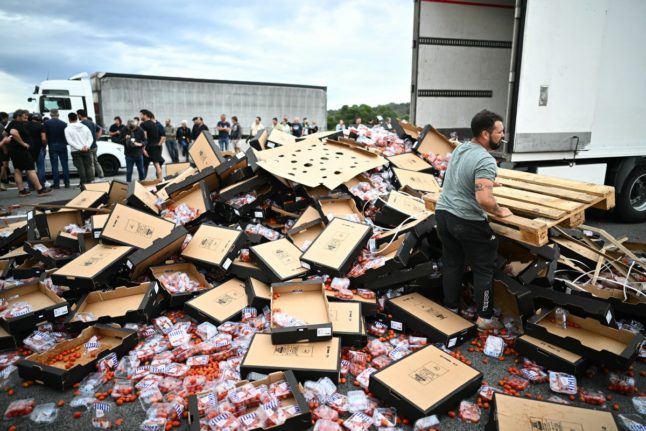French farmers behind the highly disruptive roadblock protests that have erupted across France over the past two weeks have pinpointed Spanish and Italian produce as one of their primary targets, arguing that neighbouring farmers are undercutting them.
There have been attacks on Spanish lorries carrying everything from wine to lettuce, with videos showing crates of food being smashed on the ground or set on fire.
It’s not the first time that French farmers take this aggressive approach towards Spanish produce, but according to one of Spain’s transport business associations, the latest round of vandalism is currently resulting in €12 million in losses a day.
Many Spanish lorry drivers are refusing to cross over into France for fear of what will happen to their merchandise and their vehicles.
The Spanish Confederation of Transported Goods (CETM) has said that the protesters “act with the approval of the French gendarmerie”.
“If that’s how things are going, there’s no way I am going to France right now, not me or anybody,” one lorry driver told Spanish daily El Mundo.
France’s former environment minister Ségolène Royal has added fuel to the fire by going on French news channel BFMTV and stating that Spanish tomatoes are “inedible”, as well as claiming that Spanish organic food is “fake” and that French “consumers are being tricked”.
La exministra francesa Ségolène Royal dice que nuestros tomates son incomestibles 🙄
A esta mujer la conocí hace dos décadas, cuando era la gran esperanza del feminismo francés para ser la primera PRESIDENTA del país galo. Siempre tuvo un odio elitista hacia todo lo hispano pic.twitter.com/0aRk44YkbP
— MΛRC VIDΛL (@marcvidal) February 1, 2024
According to Royal, the French food industry “makes an effort to meet quality and food safety standards by reducing pesticides that harm the environment” while suffering “disrespect on the part of Spanish products, which scandalously fail to meet those standards”.
This latest jibe in what the Spanish press is dubbing “agri-food nationalism” has led Spanish Prime Minister Pedro Sánchez to come out in defence of el tomate español.
“I think Mrs. Royal has not had the good fortune of tasting the Spanish tomato,” Sánchez told a press conference in Brussels.
“I’m inviting her to come to Spain and try any of Spain’s tomato varieties, and she will see that the Spanish tomato is unbeatable”.
El tomate español es imbatible. pic.twitter.com/PMBBmL5QQF
— Pedro Sánchez (@sanchezcastejon) February 1, 2024
So is there any truth to the accusations from French farmers and the former French environment minister?
Since France’s agricultural protests began two weeks ago, criticism against Spanish farmers has been on the rise, with accusations of them flooding the French market with cheap products that are of a lower environmental standard than French ones.
“There is no competitive advantage for Spanish products with respect to any other in the internal market,” Sánchez argued, adding that Royal’s claims were “unfounded”.
“The same rules apply in France, in Spain, in Portugal, in Italy, in Holland and in the rest of the member states”.
However, French Prime Minister Gabriel Attal has sided with French farmers by claiming that they “have rules imposed on them that others don’t” due to EU legislation.
France imports approximately 50 percent of its vegetables and 60 percent of its fruit, which illustrates how competition from other Mediterranean food producers is strong and hard to counteract.
In reality, both French and Spanish farmers face a bigger commercial threat from the Moroccan tomato, as a Free Trade Area agreement between the EU and North African country has allowed Moroccan tomato imports across Europe to grow exponentially every year since 1996.
In 2022, Morocco exported 740 million kilos of tomatoes to the EU, with France being their main importer, as Spain lost its place as the bloc’s main supplier of tomatoes.
Spanish MEPs have accused Morocco of mislabelling their tomatoes as Spanish and surpassing their export quota to the bloc.



 Please whitelist us to continue reading.
Please whitelist us to continue reading.
Member comments